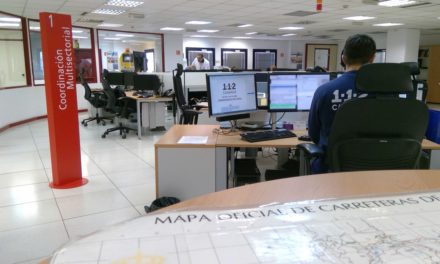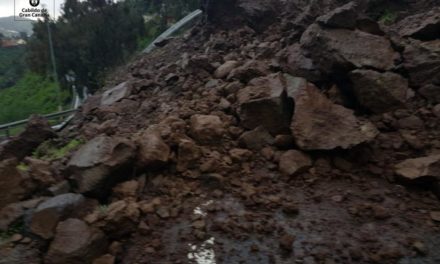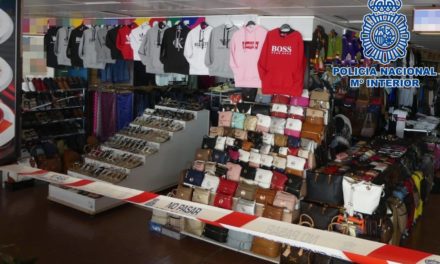Spain’s Interior Minister, Fernando Grande-Marlaska, visiting the Canary Islands today, has announced that in the “next few weeks” the controversial Arguineguín migrant reception camp, set up some months ago as a temporary measure in the port on the south of Gran Canaria, will finally be dismantled. Currently around 500 people remain at the camp awaiting coronavirus test results and more suitable accommodation, at times over recent weeks there have been more than 1,200 camped on tarmac, under canvas, at a temporary facility that was meant to briefly serve up to no more than a few hundred at a time.
Grande-Marlaska made the announcement this Friday, during a press conference alongside the European Commissioner for the Interior, Ylva Johansson, and the President of the Canary Islands, Ángel Víctor Torres, during a visit to Gran Canaria to address the management of the migration crisis in the archipelago, he said “In the next few weeks we will be in a position to proceed with the closure of the operation installed at the harbour. We are carrying out the necessary work to enable the required infrastructures so that migrants can pass those first 72 hours of police processing, through military facilities at the old Barranco Seco buildings supplied by [the department of] Defense.”
He said the aim was to guarantee both the “dignity” of migrants and the “proper development and work” of police officers.
 According to the minister, this decision is a sign that when administrations work together and in coordination, solutions can be found for the benefit of all, even if the situations are complicated, pointing out that the Government continues working on coordination between administrations, the fight against the mafias that traffic people and on “real” cooperation with the countries of origin and transit.
According to the minister, this decision is a sign that when administrations work together and in coordination, solutions can be found for the benefit of all, even if the situations are complicated, pointing out that the Government continues working on coordination between administrations, the fight against the mafias that traffic people and on “real” cooperation with the countries of origin and transit.
“This way we can be sure to continue improving the management of migratory flows to alleviate the pressure that exists today in the Canary Islands,” he said.
In regard to cooperation with the countries of origin and against the criminals involved, Grande-Marlaska pointed out that Spain has now strengthened the capabilities of State Security Forces, specifically the National Police and the Civil Guard, in key countries such as Mauritania.
Similarly, a Civil Guard maritime surveillance aircraft has also been sent to Mauritania to carry out specific preventive tasks. “This new aircraft adds to the maritime and air resources that we already have there to, in collaboration with the country’s authorities, facilitate rescues at origin and avoid deaths.”
Regarding people smuggling gangs, he emphasised that all this week agents from the EU border force, Frontex, have been working at the Arguineguín migrant reception camp, and elsewhere, bringing further capabilities and experience to the work of security forces here on the ground.
The minister plans to meet with a counterpart on November 20 in Rabat (Morocco) to address the situation of irregular migration and the continued pressure that the archipelago is enduring. One of the major problems has been the closure of borders in several countries due to the pandemic, which has hindered and delayed repatriation of migrants who do not have a legitimate asylum claim.
Canary Islands President, Ángel Víctor Torres, pointed out that during 2019 there were just 89 boats and pateras that arrived in the archipelago carrying 1,516 people. This figure increased in 2020 to 449 irregular boats so far, carrying at total of 12,743 people, representing an increase of more than 724% and there are still two months to go to the end of the year.
 After the meeting to analyse the situation and seek comprehensive solutions together with the Government of Spain and the EU, Torres also spoke at the press conference, held in the Government Delegation in Las Palmas de Gran Canaria together with Marlaska and Johansson. He stressed that the phenomenon of migration by sea to the islands “demands urgent action. We are at the moment of reaction,” he insisted,”rather than planning, because we must respond promptly: the EU and the Government of Spain must be on the side of the Canary Islands”.
After the meeting to analyse the situation and seek comprehensive solutions together with the Government of Spain and the EU, Torres also spoke at the press conference, held in the Government Delegation in Las Palmas de Gran Canaria together with Marlaska and Johansson. He stressed that the phenomenon of migration by sea to the islands “demands urgent action. We are at the moment of reaction,” he insisted,”rather than planning, because we must respond promptly: the EU and the Government of Spain must be on the side of the Canary Islands”.
Torres also indicated that the Canary Islands had at one point a total of 4,880 designated reception places, pointing out that over recent years infrastructure created following the 2006 crisis had been reduced to just 300 available spaces, emphasising that facilities were “dismantled on the islands of El Hierro, Tenerife, Gran Canaria and Fuerteventura”, facilities “that now we long for because they could have been used to respond to arriving migrants”.
 Torres revealed that this October has seen the most irregular migrants ever to have arrived on the islands, more than even previous migration crises.
Torres revealed that this October has seen the most irregular migrants ever to have arrived on the islands, more than even previous migration crises.
“The Canary Islands is as much Spain as is Madrid, and vice versa; and it is as much Europe as is Paris or Brussels. In the same way, we are a southern border and when we receive migrants, Europe has to respond. It is a question of solidarity and requires that they lend a hand to the Canary Islands. We alone cannot [do this]” added the President.
Furthermore, Torres indicated to the commissioner that, although the EU agreement of June 23, in the face of the COVID-19 socio-economic crisis “was exemplary, now another will be needed due to the second wave of the pandemic, as it lacked a solidarity response on irregular immigration, something that must be dealt with urgently”. The president reviewed too the history of migration, within living memory, from the Canaries to Venezuela, Argentina and Uruguay, caused by the dictatorship and famine, making clear that Canary Islanders understand this phenomenon well, but should never be left to deal with circumstances such as these without the help of the other institutions. He pointed out that Canarian administrations have perfectly complied with their responsibilities to unaccompanied minors, ensuring the safety of nearly 1,400 this year, and insisted that the EU and Spain’s central government must stand alongside the Canary Islands.











